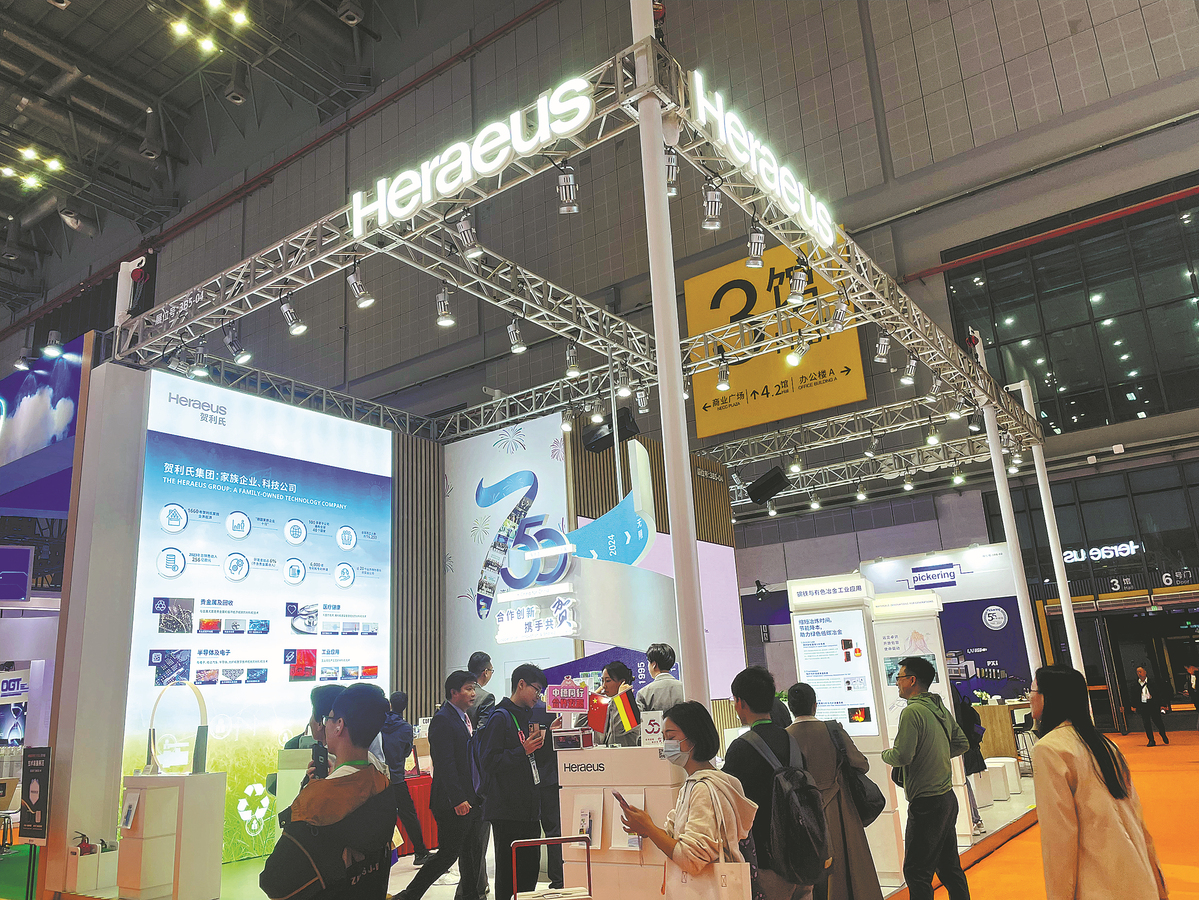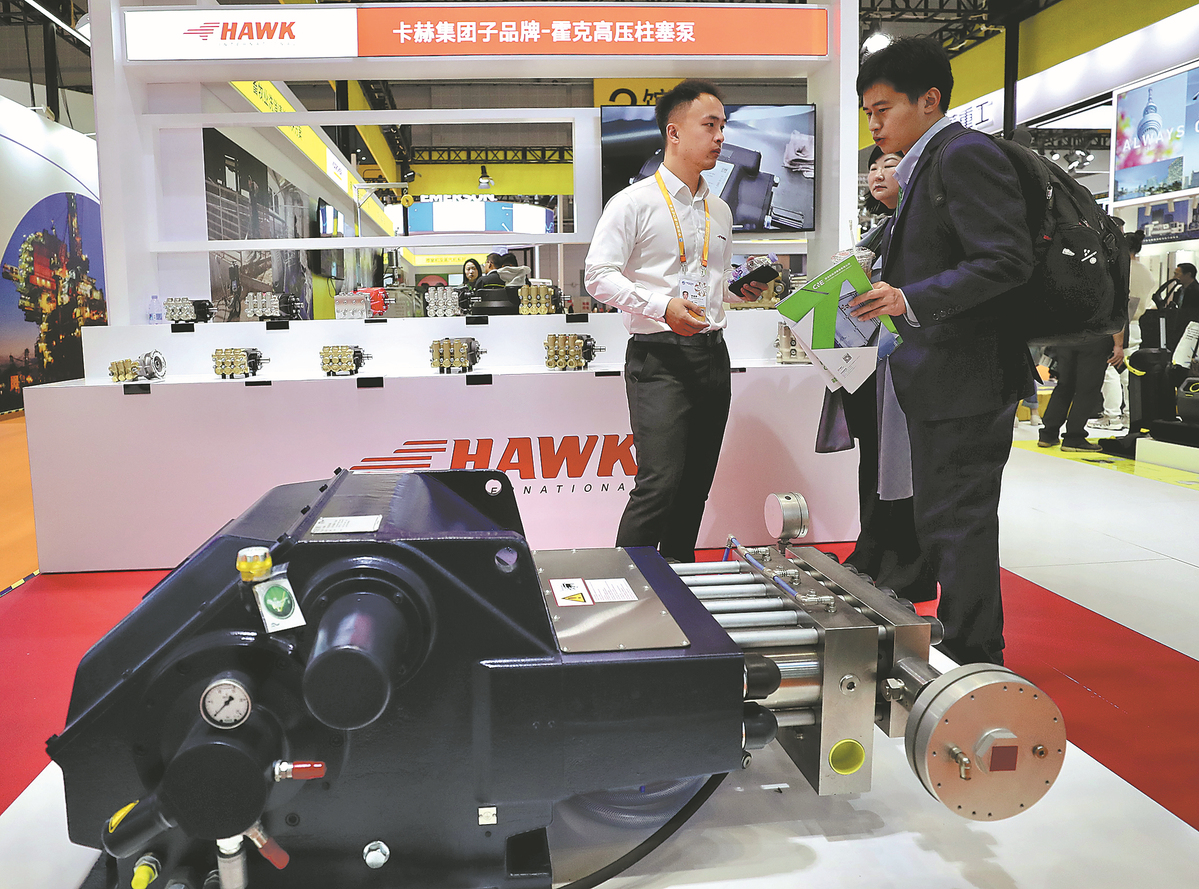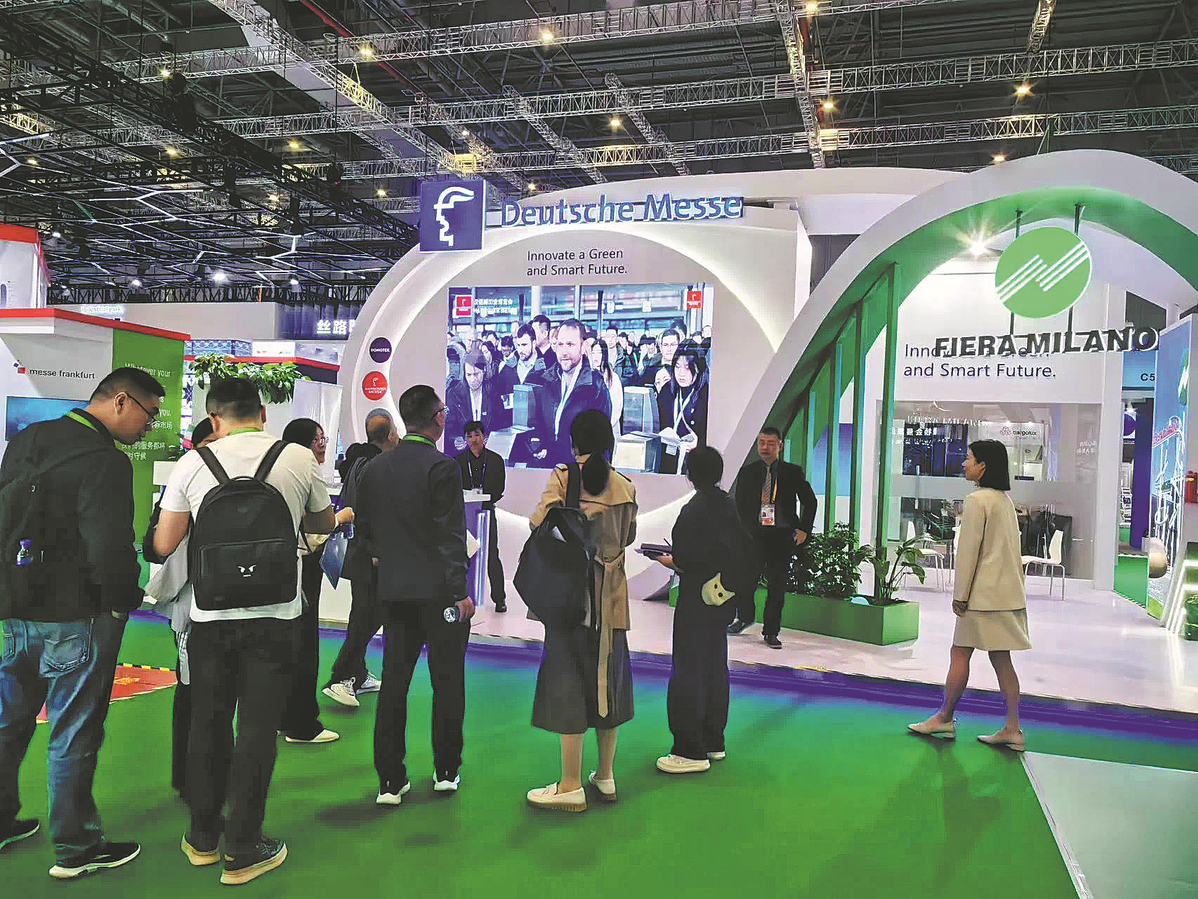
Visitors gather at German technology group Heraeus' booth during the seventh China International Import Expo in Shanghai last week. [Photo/China Daily]
Eyeing an increased level of innovative capacity and openness, German enterprises are beefing up investment in the Chinese market and injecting new momentum into Sino-German cooperation, said company executives during the recently concluded seventh China International Import Expo in Shanghai.
In the newly established new materials zone at this year's CIIE, German technology group Heraeus, a seven-time CIIE participant, showcased an array of high-quality materials and advanced technologies in areas such as precious metals, recycling, semiconductors, electronics, healthcare and industrial applications.
"We are thrilled to be featured in the newly established new materials zone, which aligns perfectly with our expertise," said Jan Rinnert, CEO and chairman of the board of managing directors of Heraeus Group. "We are delighted to see such materials being recognized as having strategic importance in China, where we can further contribute."
Celebrating its 50th year of development in China, Rinnert said the company sees this milestone as a successful result of China's innovation-driven strategy and its emphasis on nurturing new quality productive forces.
"We operate with a philosophy of'In China, for China' to stay close to our customers and provide timely service. In recent decades, China has been shifting toward an innovation-driven economy. We have also invested heavily in our local innovation capabilities to support this," he said.
Looking to the next 50 years, Rinnert said Heraeus will continue to enhance its local innovation capabilities and deepen cooperation to achieve sustainable growth in China.
"China will remain one of the most important markets for us. We will continue to expand our capacity and innovation capabilities, invest in and nurture our talents," he said.
The German tech player hopes to further cultivate the Chinese market by introducing more advanced products and technologies, advancing investment projects and strengthening local innovation efforts, said Kevin Chen, a senior executive at Heraeus, adding that it aims to contribute to China's economic growth by supporting high-quality development in related sectors.
Another long-standing CIIE exhibitor, German cleaning equipment manufacturer Karcher, also participated for the seventh time and debuted its sub-brand Hawk at the technology and equipment zone of the expo.
"As a long-term supporter of CIIE, we are honored to witness the show's success," said Marco Cardinale, Karcher's chief technology officer. "The spillover effects of this exhibition have been instrumental in expanding our sales, production, and brand presence in China over the past seven years."

A view of German cleaning equipment manufacturer Karcher's booth during the seventh CIIE in Shanghai.[Photo/China Daily]
Cardinale added the company has also established a new research and development center in Suzhou, Jiangsu province, to drive local innovation and reinforce its presence in the China market, with the recent launch of a phase-three expansion project of its factory in Changshu, adding a 6,000-square-meter facility to its existing 40,000 square meters of space.
This year marks the tenth anniversary of the Sino-German Comprehensive Strategic Partnership, with bilateral economic and trade cooperation between China and Germany continuing to deepen.
According to data from Bundesbank, Germany's central bank, German direct investment in China reached 7.3 billion euros ($7.7 billion) in the first half of the year, compared to 6.5 billion euros in the same period of 2023.
China stood as Germany's largest trading partner last year. According to data from the German Federal Statistical Office, Germany's trade volume with China reached 253.1 billion euros in 2023, marking the eighth consecutive year that China has been Germany's most important trading partner.
Yang Ming, vice-chairman of the Senate of Economy Europe and chief representative in China for the Summit of World Market Leaders, attributed the increased investment trend to the practical needs of companies on both sides, the growth potential within the domestic market, and the ongoing enhancement of local companies' innovation capabilities, which together create significant potential for China-Germany cooperation.
"China not only offers a vast market and large consumer base, but also serves as a gateway to the broader Asian region. For instance, through the China-ASEAN free trade area, German companies gain access to even larger markets," Yang said in an earlier interview with Xinhua News Agency.
"German-Chinese cooperation has spanned decades, with large multinational corporations having already established a strong foundation in China. Additionally, many small and medium-sized enterprises, especially 'hidden champions', have a strong demand for investment and business development in the region," he added.
As one of the key platforms for exchanges between Chinese and German firms, German trade fair company Deutsche Messe AG participated in the CIIE for the fourth time this year, transitioning from an observer to an exhibitor.
Since the first edition of the expo, the group has witnessed a huge number of companies transition from initial attendees to active exhibitors — the shift not only underscores the expo's allure, but also highlights the vast potential of the Chinese market and the priority that global companies place on it, said Jochen Koeckler, chairman of the managing board at Deutsche Messe AG.
"It's a crucial platform for companies to showcase their innovations and enter new markets," he said. "We aim to leverage the global scope of the expo to introduce high-quality international exhibitions to China, while collaborating with our Chinese partners to explore new opportunities in overseas markets and present Chinese innovations to the world," Koeckler said.
The company executive also spoke highly of his experience at the seventh CIIE, particularly the convenience of the visa process, which greatly facilitated his trip to China.
"Despite global challenges posed by the COVID-19 pandemic, the Chinese government provided efficient visa services to international exhibitors, which not only reflects China's open attitude toward international cooperation, but also showcases the inclusivity and appeal of the CIIE as a platform for global exchange," he said.

The booth of German trade fair company Deutsche Messe AG at the seventh import expo.[CHINA DAILY]
Deutsche Messe AG has cultivated its presence in the Chinese market for over 30 years. This year, under the theme "Innovate a Green and Smart Future", it showcased more than 50 flagship exhibition projects across 20 industries worldwide. During the six-day event, its booth attracted 2,145 visitors, marking a 26 percent increase over the previous year, the company said.
At a promotional event for the seventh CIIE held in Stuttgart, Germany, in June, Wu Zhengping, deputy director of the CIIE Bureau, said German companies had shown great enthusiasm in participating in the expo.
"Germany leads European countries in both the number of exhibitors and exhibition area, demonstrating German enterprises' strong confidence in the potential of the Chinese market and their strong willingness to collaborate," Wu said.
Held from Nov 5 to 10, this year's CIIE saw a total of $80.01 billion worth of tentative deals reached for one-year purchases of goods and services, up 2 percent year-on-year, said the expo's bureau during its closing ceremony on Sunday.
"This year, multinational companies have introduced 450 new products, technologies, and services for their debut showcases, including over 100 global premieres, 40 debuts in Asia, and more than 200 first appearances in China, sparking new momentum in consumer demand," said Wu during the ceremony.